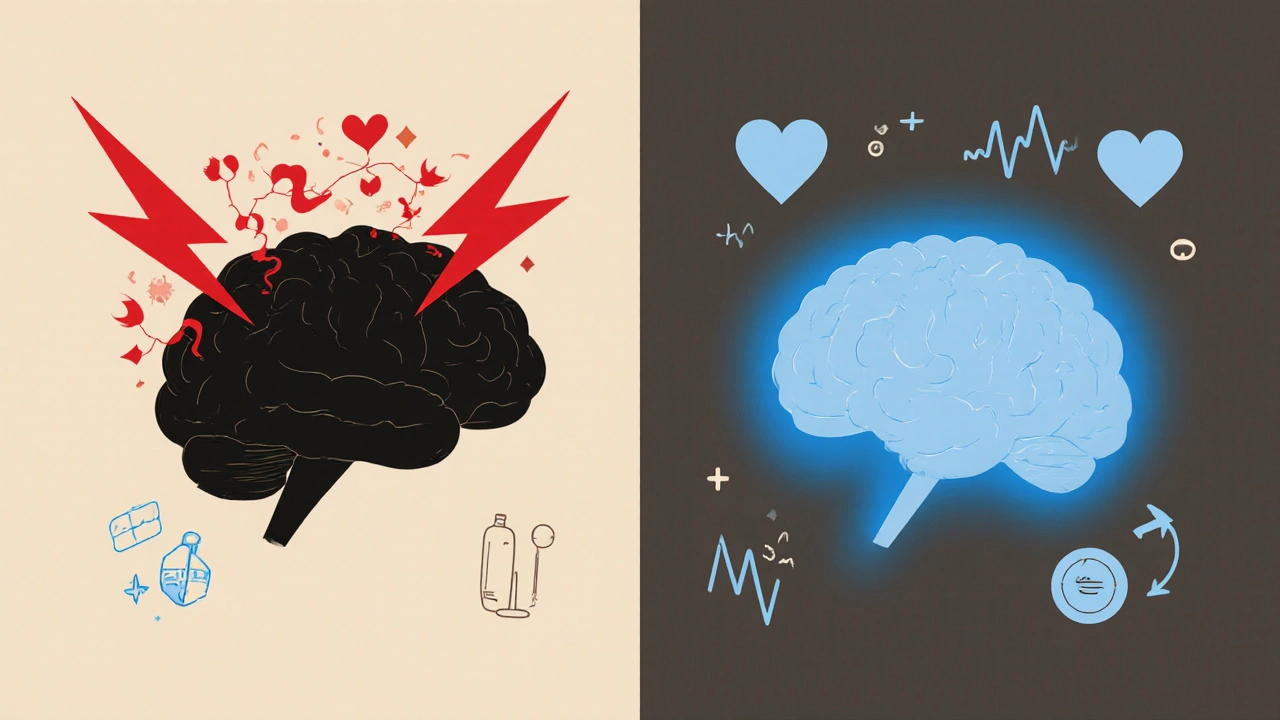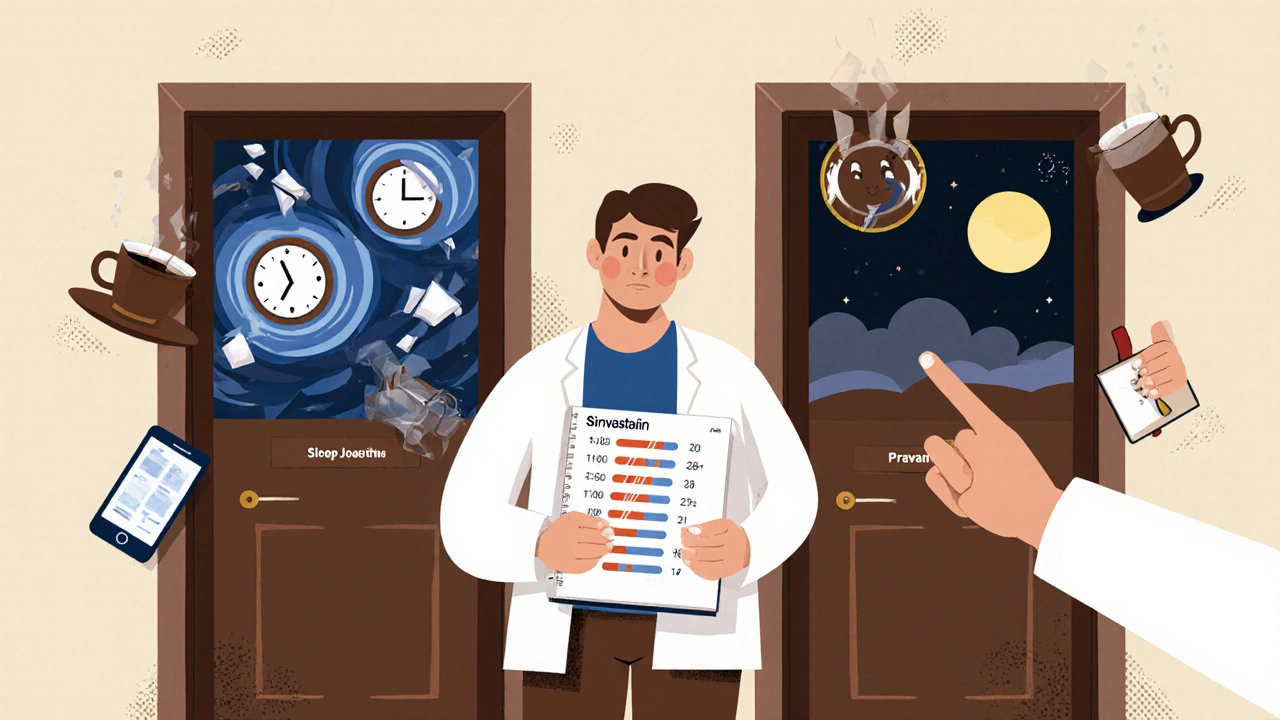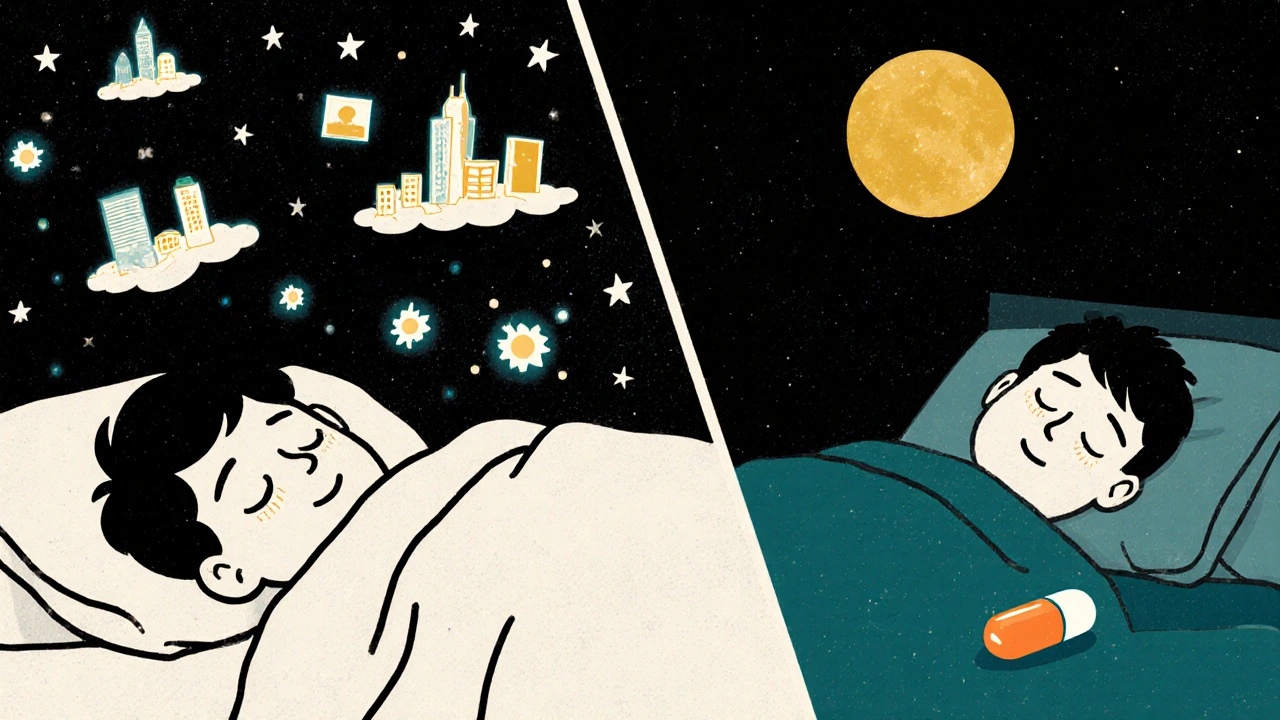Many people take statins to lower their cholesterol and protect their heart. But if you’ve started taking one recently and now can’t fall asleep-or you’re having wild, lifelike dreams-you’re not alone. Thousands of patients report the same thing. The question is: is it the statin? Or is it something else?
Do Statins Really Cause Sleep Issues?
The short answer? It’s complicated. Some studies say yes. Others say no. And some say it depends on which statin you’re taking.
Statins like simvastatin and lovastatin are lipophilic, meaning they can cross the blood-brain barrier more easily. That’s why some researchers think they might interfere with brain chemicals involved in sleep. Pravastatin and rosuvastatin, on the other hand, are hydrophilic-they don’t enter the brain as easily. And guess what? People taking these tend to report fewer sleep problems.
In a 2007 study led by Dr. Beatrice Golomb, 1,016 adults took either simvastatin, pravastatin, or a placebo. Those on simvastatin reported significantly worse sleep quality and more sleep disturbances than those on pravastatin or the placebo. Pravastatin? It performed just like the placebo-no real difference. That’s a big clue.
What About Atorvastatin? The Confusing Data
Then there’s atorvastatin. It’s one of the most prescribed statins in the UK and US. But here’s the twist: a 2018 study of 10,000 patients found that those taking atorvastatin actually reported fewer sleep problems than those on a placebo. That’s right-less insomnia, not more.
So why the contradiction? One theory is the nocebo effect. If you read online that statins cause vivid dreams, your brain might start looking for signs of it-even if the drug isn’t the cause. A 2023 British Heart Foundation report noted that many patients assume their sleep issues are from statins, but when they switch to a different one or stop temporarily, the problem often disappears… even if they were never on the statin at all.
Simvastatin vs. Pravastatin: The Sleep Divide
Let’s break it down by drug.
- Simvastatin: High risk. FDA reports show it accounts for over 40% of all statin-related sleep disturbance complaints, even though it’s not the most prescribed. In one study, users reported vivid dreams, night awakenings, and difficulty falling asleep.
- Lovastatin: Similar pattern. Early case reports from the 1990s described patients losing 1-3 hours of sleep after starting lovastatin. Symptoms vanished when they stopped.
- Pravastatin: Low risk. Multiple studies show no significant difference in sleep quality compared to placebo.
- Rosuvastatin: Mixed signals. Some data suggests a slight increase in sleep complaints, but not as strong as simvastatin.
- Atorvastatin: Neutral to beneficial. Most large trials show no negative effect-some even show improvement.
The pattern? Lipophilic statins (simvastatin, lovastatin) = more sleep trouble. Hydrophilic ones (pravastatin) = minimal to none.

Why Vivid Dreams? The Science Behind the Nightmares
Statins block cholesterol production. But cholesterol isn’t just for arteries-it’s also a building block for brain chemicals like serotonin and melatonin. If your brain’s getting less of it, could that affect REM sleep? That’s the theory.
REM sleep is when most dreaming happens. Some researchers think statins might increase REM activity or make dreams more intense by altering brain chemistry. It’s not proven, but it fits the pattern: people report dreams so vivid they feel real-like reliving childhood memories or flying through cities.
One Reddit user, u/CholesterolConfused, wrote: "Switched from atorvastatin to pravastatin 3 weeks ago and my crazy dreams stopped immediately." That’s not rare. Dozens of similar stories pop up in patient forums.
Is It the Statin-or the Muscle Pain?
Here’s a twist you might not know: muscle pain from statins (called SAMS) might be the real culprit behind poor sleep.
A 2024 study found that people with statin-related muscle pain had worse sleep quality. But when they stopped the statin, their sleep improved-faster than expected. They fell asleep quicker, woke up less at night, and felt less tired during the day.
So maybe it’s not the brain. Maybe it’s the body. If your legs ache or your shoulders feel stiff, you’re going to toss and turn. And that pain might be mistaken for a "sleep problem caused by statins." But it’s actually muscle pain disrupting sleep.

What Should You Do If You’re Having Sleep Issues?
Don’t stop your statin on your own. Heart attacks and strokes are far more dangerous than bad dreams.
Here’s what to try instead:
- Track your sleep. Keep a simple log: bedtime, wake time, how many times you woke up, dream intensity (1-10 scale). Do this for two weeks.
- Check your timing. Some people find taking statins in the morning instead of at night helps. It’s not proven, but it’s low-risk.
- Ask your doctor about switching. If you’re on simvastatin or lovastatin, ask if switching to pravastatin or rosuvastatin is an option. Many patients report relief within 2-4 weeks.
- Rule out other causes. Stress, caffeine after 2 p.m., screen time before bed, or sleep apnea can all cause the same symptoms.
- Consider a short break. Under medical supervision, stopping the statin for 2-4 weeks can tell you if it’s the drug. If sleep improves, it’s likely related.
Bottom Line: It’s Not One-Size-Fits-All
Statins save lives. For someone who’s had a heart attack, the benefits far outweigh any sleep risks. But for someone with no history of heart disease, taking a statin just because their cholesterol is a bit high? That’s a different story.
If you’re having sleep issues:
- Don’t panic.
- Don’t assume it’s the statin.
- Do talk to your doctor about your specific drug and symptoms.
- Do consider switching to a hydrophilic statin like pravastatin.
The science isn’t settled. But the evidence points to one thing: not all statins are the same. Your sleep might be fine on one-and ruined on another.
Can statins cause vivid dreams?
Yes, some people report vivid or intense dreams while taking certain statins, especially simvastatin and lovastatin. These are often described as lifelike, emotionally charged, or even disturbing. The exact reason isn’t known, but it may be linked to how these statins affect brain chemistry or REM sleep. Switching to pravastatin or rosuvastatin often reduces or eliminates this side effect.
Which statin is least likely to cause insomnia?
Pravastatin is the statin least associated with sleep problems. Studies show it performs no differently than a placebo in terms of sleep quality. Rosuvastatin is also generally well-tolerated, though some reports suggest minor sleep issues in a small number of users. Avoid simvastatin and lovastatin if sleep disturbances are a concern.
Do statins make you sleepy during the day?
Statins don’t usually cause daytime sleepiness. In fact, many people feel more alert after switching from a lipophilic statin like simvastatin to a hydrophilic one like pravastatin. If you’re feeling tired during the day, it’s more likely due to poor sleep at night-possibly from muscle pain, anxiety, or another condition-not the statin itself.
How long does it take for sleep to improve after stopping a statin?
For most people, sleep issues improve within 2 to 4 weeks after stopping the statin. Some notice changes in just a few days, especially if vivid dreams were the main problem. Muscle-related sleep disturbances may take a bit longer to resolve, typically 3-6 weeks. Always consult your doctor before stopping any medication.
Is it safe to switch statins if I’m having sleep problems?
Yes, switching statins is common and generally safe under medical supervision. If you’re on simvastatin or lovastatin and having sleep issues, your doctor may recommend switching to pravastatin or rosuvastatin. Many patients report immediate improvement. Your cholesterol levels should be monitored after the switch to ensure they stay under control.

9 Comments
Jennifer BedrosianNovember 4, 2025 AT 15:25
I switched from simvastatin to pravastatin and my dreams went from 'I was fighting a dragon in a taco truck' to 'I remembered what I had for breakfast.' Like... why did no one tell me this was a thing? I thought I was losing my mind.Lashonda ReneNovember 6, 2025 AT 08:40
i just want to say that i was on atorvastatin for like 3 years and never had a single bad dream but then my doc switched me to simvastatin because it was cheaper and holy cow i started having dreams where i was flying over the ocean on a giant fish and then i woke up screaming because the fish was singing opera i dont even know what happened but now im back on pravastatin and its like my brain finally got a vacationAndy SlackNovember 6, 2025 AT 11:40
This is why you gotta be smart about meds. Not all statins are created equal. Pravastatin is the quiet hero of the cholesterol world. Simvastatin? More like the drama llama. Switch if you can.Rashmi MohapatraNovember 8, 2025 AT 01:46
people these days blame everything on pills. my aunt had bad dreams and she stopped her medicine and then got heart attack. you think dreams are worse than dying? stupid.Abigail ChrismaNovember 9, 2025 AT 16:34
I’m so glad this post exists. I’ve been trying to explain to my mom that it’s not just "being old" or "stress"-it’s the specific statin. She was on simvastatin for years, had night terrors, thought she was hallucinating. Switched to pravastatin, slept like a baby. No magic, just science. And yes, the dreams were wild. I once dreamed I was teaching a class to dolphins. Real. Details. Even the smell of saltwater.Ankit YadavNovember 10, 2025 AT 20:09
If you're having sleep issues on statins, don't just assume it's the drug. Check your caffeine, your screen time, your stress. But also-don't ignore it. Track it. Talk to your doc. Pravastatin is a solid option if your current one's messing with your REM. No need to suffer in silence.Meghan RoseNovember 11, 2025 AT 14:43
I read this whole thing and I still think you’re all overreacting. I’ve been on rosuvastatin for 5 years and I sleep like a log. If you’re having weird dreams, maybe you’re just anxious. Or watching too much Netflix before bed. Or you’re not getting enough magnesium. Or maybe you’re just a weirdo who dreams too much. It’s not the pill.Steve PhillipsNovember 13, 2025 AT 11:07
Oh, so now we’re blaming statins for dreams? Next, we’ll be blaming vitamin D for why your ex ghosted you. The nocebo effect is a real thing-and you people are *performing* insomnia like it’s a Broadway show. "Ooooh, I dreamed I was a pirate queen on Mars! It must be the simvastatin!" No. You’re just a suggestible human with a Netflix algorithm that knows your trauma better than your therapist.Rachel PunoNovember 14, 2025 AT 08:42
To everyone who said they switched and slept better-thank you. I was scared to bring it up with my doctor, but now I’m going to ask about pravastatin. You’re not crazy. And you’re not alone. Your sleep matters. Your dreams matter. And your health is worth asking questions about.